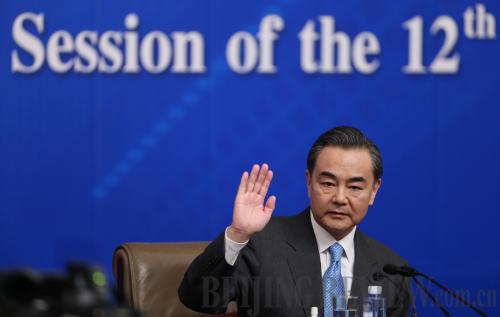|
 |
|
GLOBAL VISION: Foreign Minister Wang Yi attends a press conference in Beijing on March 8 (JIN LIWANG) |

The Second Session of the 12th National People's Congress (NPC)—held in Beijing from March 5 to 13—is seen as a test of the sincerity of the Chinese Government in honoring its commitment to reform. More than 3,000 reporters, including about 1,000 from abroad, gathered in Beijing with an eye on China's policy trends.
Most of their attention was focused on two questions: First, can China advance its reform faithfully and continue to be the engine of economic growth in the Asia-Pacific region and beyond? Second, what kind of global strategy will China pursue after becoming stronger, and will it adopt a hard-line foreign policy?
Active foreign relations
In his first government work report as Chinese premier, Li Keqiang expounded on the progress his cabinet has made during the past year and revealed the government's future plans, pledging to advance comprehensive reform in all fields with steadfast determination as well as courage. In the 17,000-character report, Premier Li devoted only about 350 characters to China's foreign policy, reiterating that China is firmly committed to pursuing the path of peaceful development and a win-win strategy of opening up.
Three days later, when China's Foreign Minister Wang Yi was invited to an NPC press conference to take questions from domestic and foreign media about China's foreign policy and external relations, Wang said that in 2014 China will continue to pursue an active foreign policy that serves domestic reform. The foreign minister defined the key tasks of his ministry for this year as: strengthening friendly relations with all other countries in the world, especially neighbors; creating a more enabling external environment for domestic reform and development; pursuing vigorously economic diplomacy; deepening win-win cooperation with other countries; and creating more favorable conditions for the transformation and upgrading of China's economy.
Since China introduced the reform and opening-up policy in 1979, its national strategy has focused on domestic economic development combined with low-profile diplomacy. After 35 years, though China has become the second largest economy as well as the No.1 trade power, the country is faced with more complicated domestic obstacles. The present administration admits frankly that China's reform has entered a critical stage and a deep-water zone. China faces arduous tasks in maintaining economic growth, adjusting the economic structure, improving people's livelihood as well as fighting corruption. It will continue to be a domestic-oriented country. Thus, its diplomacy must maintain a high degree of consistency and stability.
The outside world has long judged China's external strategy by the rapid growth of its national defense budget. China's defense budget this year totals 808.23 billion yuan ($132 billion), a rise of 12.2 percent year on year. The newly added defense spending will be mainly used to step up the modernization of weapon systems, improve soldiers' living standards and promote military system reform. The moderate growth of China's defense budget is fair and reasonable and meets the demand to safeguard China's security. In response to foreign concerns, Fu Ying, spokeswoman for the Second Session of the 12th NPC, told a press conference that peace can only be maintained by strength.
Firm stance on core interests
Premier Li stressed safeguarding China's sovereignty, security and development interests in his government work report. Specifically, he stated, "We will safeguard the victory of World War II and the postwar international order, and will not allow anyone to reverse the course of history." This statement is a clear message to Japan showing China's resolution to fight against the Shinzo Abe administration's right-wing policies.
In the past year, maritime disputes in the East China Sea and the South China Sea have put a severe strain on China's relations with Japan and the Philippines. In response to a question over territorial and maritime disputes, Wang replied that China's position is firm and clear on issues of territory and sovereignty.
"We will not take anything that isn't ours, but we will defend every inch of territory that belongs to us; we will never bully smaller countries, yet we will never accept unreasonable demands from smaller countries," Wang said. Wang declared China would like to carry out equal-footed consultation and negotiation to properly handle the issues by peaceful means on the basis of respecting historical facts and international law. "There will not be any change to this position," the foreign minister concluded.
| 